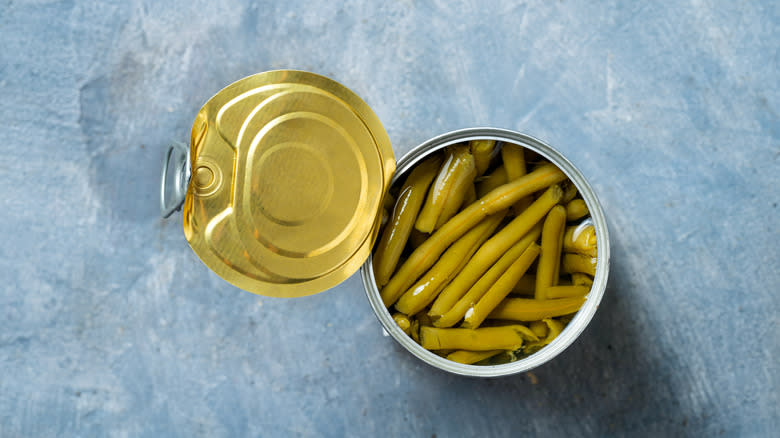Canned legumes are convenient sources of fiber, protein, and antioxidants. They’re pre-cooked, ready to eat, and require less prepping effort than their raw counterparts. Canned green beans, for example, are great in a Thanksgiving day casserole or as a simple side dish paired with a roast chicken dinner. Despite their convenience, canned green beans aren’t as nutrient-dense as you might think. Although green beans are teeming with health benefits, they are often canned in excessive amounts of sodium.
Primarily, sodium is introduced to the commercial green bean canning process to preserve its freshness and expand its shelf life. The added sodium can also enhance the flavor of the legumes. However, just half a cup of canned green beans can contain up to 380 milligrams of sodium, which is about 16% of the recommended daily intake — a significant amount for such a small serving of vegetables. Although 16% may seem insignificant, sodium is often hidden in many of the everyday foods we consume, adding up quickly. The Centers for Disease Control and Prevention estimates that Americans alone consume over 3,300 milligrams of sodium per day — 1,000 milligrams over the suggested sodium intake — which makes a salt-packed serving of canned green beans more insidious than meets the eye.
Long-term overconsumption of sodium increases the risk of various cardiovascular diseases — a leading cause of death in the United States. Next time you’re craving green beans, cooking canned varieties is worth reconsidering.
Read more: 12 Canned Foods You Should Avoid At The Grocery Store
Solutions And Alternatives For Sodium-Packed Canned Green Beans

Canned green beans can simplify cooking significantly, which makes the sodium situation pretty discouraging. But don’t fret — not all hope is lost. There are some solutions and alternatives for sodium-dense canned green beans.
Luckily, many canned food brands manufacture sodium-free green beans. By opting for those packaged without excessive levels of sodium, you can enjoy the nutrient-dense benefits of green beans without triggering concerns over your cardiovascular health. When they’re not loaded with salt, canned green beans are just as nutritious as their raw counterparts.
If you cook with sodium-preserved canned green beans, draining and thoroughly rinsing them can reduce the salt content by up to 9%, according to a study conducted by the Nutrient Data Laboratory at Beltsville Human Nutrition Research Center. Although it’s a small reduction, small habits can lead to big health improvements.
If you have the tools to practice safe home canning, packaging and preserving your own green beans with limited amounts of sodium is an easy way to get shelf-stable veggies without the health concerns. Of course, you can always just cook raw green beans, which gives you more agency over the texture and flavor of the final dish.
Read the original article on The Daily Meal.
